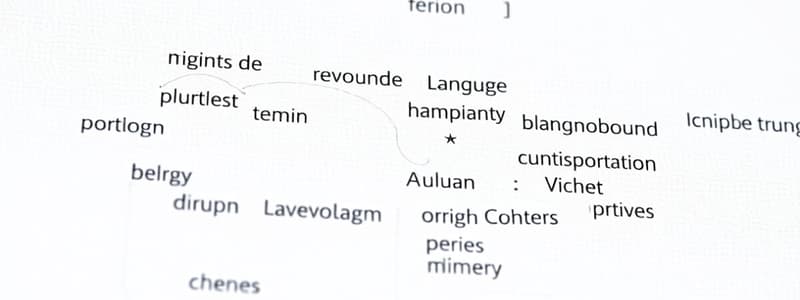Podcast
Questions and Answers
Which of the following outcomes is a likely consequence of language policy and planning decisions?
Which of the following outcomes is a likely consequence of language policy and planning decisions?
- An increased likelihood of language shift or language maintenance. (correct)
- The elimination of all regional dialects to promote national cohesion.
- The automatic improvement of individual linguistic abilities.
- A decrease in the overall number of languages spoken in the world.
A local government decides to promote the use of a minority language in official documents and public signage. Which type of language planning does this initiative primarily represent?
A local government decides to promote the use of a minority language in official documents and public signage. Which type of language planning does this initiative primarily represent?
- Dialect leveling.
- Corpus planning.
- Status planning. (correct)
- Acquisition planning.
A language policy that mandates the exclusive use of a foreign language in higher education is most likely to impact which aspect of language planning?
A language policy that mandates the exclusive use of a foreign language in higher education is most likely to impact which aspect of language planning?
- Corpus planning by simplifying the grammar of the foreign language.
- Status planning by elevating the prestige of the foreign language.
- Acquisition planning by affecting language learning and medium of instruction. (correct)
- All of the above.
What is the most likely outcome when a language policy is implemented without considering the community's attitudes and beliefs about their native language?
What is the most likely outcome when a language policy is implemented without considering the community's attitudes and beliefs about their native language?
An educational reform aims to standardize the spelling and grammar of a regional dialect to make it easier to teach in schools. Which aspect of language planning is primarily being addressed?
An educational reform aims to standardize the spelling and grammar of a regional dialect to make it easier to teach in schools. Which aspect of language planning is primarily being addressed?
In a multilingual country, the government decides to adopt a 'one language only' policy in schools and public offices. What is the MOST probable consequence of this policy?
In a multilingual country, the government decides to adopt a 'one language only' policy in schools and public offices. What is the MOST probable consequence of this policy?
Which action exemplifies corpus planning?
Which action exemplifies corpus planning?
The Philippine Constitution mandates that Filipino and English are the official languages. What type of language planning does this exemplify?
The Philippine Constitution mandates that Filipino and English are the official languages. What type of language planning does this exemplify?
Flashcards
Language Policies
Language Policies
Formal or informal statements by scholars, governments, and leaders that influence language use, maintenance, and status.
Language Planning
Language Planning
Deliberate efforts to influence language acquisition, structure, or function.
Corpus Planning
Corpus Planning
Deals with norm selection and codification, such as grammar writing and spelling standardization.
Status Planning
Status Planning
Signup and view all the flashcards
Language Acquisition Planning
Language Acquisition Planning
Signup and view all the flashcards
Philippine Constitution Language Provision
Philippine Constitution Language Provision
Signup and view all the flashcards
Impact of Language Policy and Planning
Impact of Language Policy and Planning
Signup and view all the flashcards
Purpose of Constitutional Language Provisions
Purpose of Constitutional Language Provisions
Signup and view all the flashcards
Study Notes
- Language policy and planning decisions are made globally by governments and scholars.
- These decisions impact language rights, status, and nurturing, affecting language vitality and individual rights.
- Language planning involves deliberate efforts to influence language behavior (Cooper, 1989, p. 45).
- Language planning can be formal or informal, solving communication problems, but poor policies can have negative effects.
Dimensions of Language Planning
-
Corpus planning involves norm selection and codification such as grammar and spelling standardization.
-
Status planning deals with language choice, attitudes, and political implications (Bright, 1992, p. 311).
-
Language acquisition planning is important for education.
-
Choosing instruction mediums is crucial in acquisition planning.
-
The 1987 Constitution of the Philippines, Article XIV, Sec. 6 and 7, provides the legal basis for language policies.
Studying That Suits You
Use AI to generate personalized quizzes and flashcards to suit your learning preferences.
Description
Exploration of language policy and planning, highlighting governmental and scholarly roles in shaping language decisions globally. Focus on corpus, status, and acquisition planning dimensions. Discussion of the Philippine Constitution's language policy.




